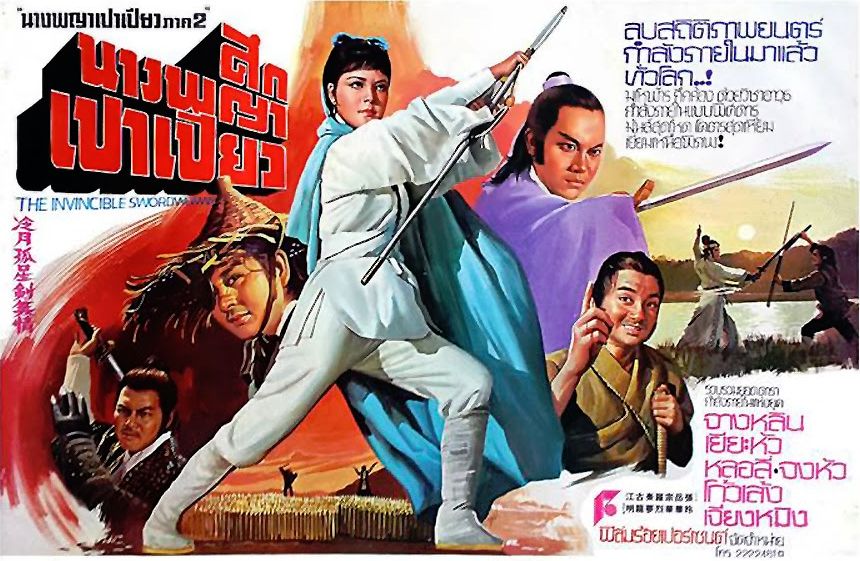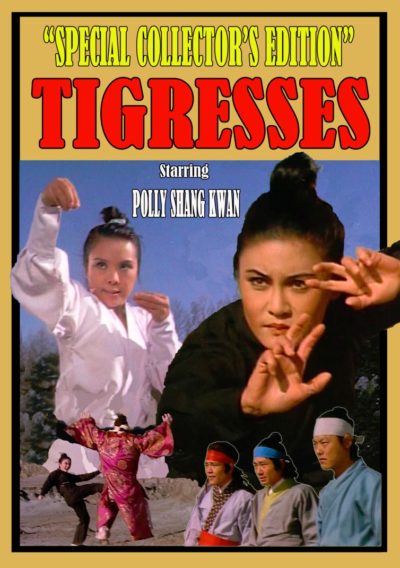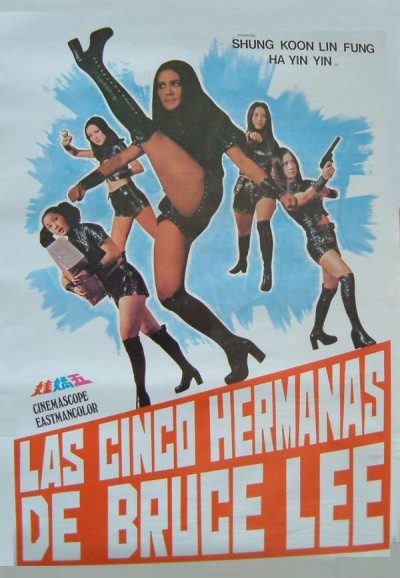★★
“Suffering from a bit of an identity crisis.”
 This Taiwanese kung-fu potboiler just about manages to sustain interest for an hour, before losing the plot (literally, and such as it was to begin with) down the stretch. It begins with ten martial arts masters stealing an omnibus edition of fighting manuals from the local Shaolin temple. Trying to get entry, and failing, because they won’t admit women, is Shi Fu Chun (Kwan). With the help of former head priest Lin Chiu (Chan), who still lives nearby, she is taught a slew of skills, and ends up assigned the task of recovering the purloined books, and restoring the temple’s honour. Oh, except the “positive kung-fu” learned is causing Shi Fu to transition into a man. So she/he (inexplicably, the 1977 film does not provide us with preferred pronouns…) needs to find and learn some “negative kung-fu” stat, to counter the process.
This Taiwanese kung-fu potboiler just about manages to sustain interest for an hour, before losing the plot (literally, and such as it was to begin with) down the stretch. It begins with ten martial arts masters stealing an omnibus edition of fighting manuals from the local Shaolin temple. Trying to get entry, and failing, because they won’t admit women, is Shi Fu Chun (Kwan). With the help of former head priest Lin Chiu (Chan), who still lives nearby, she is taught a slew of skills, and ends up assigned the task of recovering the purloined books, and restoring the temple’s honour. Oh, except the “positive kung-fu” learned is causing Shi Fu to transition into a man. So she/he (inexplicably, the 1977 film does not provide us with preferred pronouns…) needs to find and learn some “negative kung-fu” stat, to counter the process.
This is mostly standard stuff, with the novice being trained by the master, before going out into the world and putting her skills to the test. Except it feels like the movie was edited down from a four-hour version, as the story jumps from Shi having about three of the ten parts, to her heading back to the temple with them all. The heads of the ten clans then show up, and it all becomes almost incomprehensible. About the only part that I am certain about, had them forming what looked disturbingly like a kung-fu version of the Human Centipede [now, that’s a movie I would… if not perhaps pay to see, certainly consider downloading from a dodgy website]. I think one of the clan leaders tries to fight his way into the temple, defeating various occupants in different styles, leading up to a fight again Lin. He faked his own death to get Shi accepted, and since then, has apparently been sitting around the temple, covered in gold paint, because that’s what they do to dead ex-leaders.
There are a couple of bits which are kinda cool, such as Shi having to accept the branding of the temple, carried out through her carrying the red-hot cauldron depicted on the poster. One of her skills involves the ability to extend her arms and legs to remarkable length, which leads to some interesting fights. However, the old gender re-assignment plot may well reach new depths of implausibility. Somehow, this is repeatedly mistaken for a man. Another weirdness (at least, to contemporary Western viewers) is the good luck symbol on the clothing worn by the heroine and her allies. Yep, it’s the ol’ Buddhist swastika. Beyond such trivial concerns, the main problem though, is that most of the fights are pedestrian and uninteresting. The makers even bring Judy Lee in, and don’t allow her to get into action. This shows a severe misunderstanding of how things should be done, and if you pass on this, you’ll not be missing much.
Dir: Cheng Hou
Star: Polly Shang Kwan, Chan Wai-Lau, Che Chi-Sang, Judy Lee
a.k.a. Lady Wu Tang or Shaolin Tamo Systique






 An apparent knock-off of Japan’s
An apparent knock-off of Japan’s  Moving onto part two, things have… changed. Part one ended with its sole survivor sailing off in a boat. This opens with its two heroines, Kuan Mou-Hua (Yip) and Kao Chuan Tze (Heo), back running through the jungle, apparently escaping from… something. I actually watched this part first, and initially presumed the specifics were all explained in the previous installment. I can now confidently state: nope. Like so much here, even down to the location, it’s unclear. Perhaps the untranslated captions shed light on this; the dubbing (the version I saw was in German with English subs!) certainly doesn’t.
Moving onto part two, things have… changed. Part one ended with its sole survivor sailing off in a boat. This opens with its two heroines, Kuan Mou-Hua (Yip) and Kao Chuan Tze (Heo), back running through the jungle, apparently escaping from… something. I actually watched this part first, and initially presumed the specifics were all explained in the previous installment. I can now confidently state: nope. Like so much here, even down to the location, it’s unclear. Perhaps the untranslated captions shed light on this; the dubbing (the version I saw was in German with English subs!) certainly doesn’t. Okay, the above is shamelessly lifted from The Last Action Hero, in which there’s a spoof trailer for Arnold Schwarzenegger as Hamlet. But it applies just as much to this, which is remarkably progressive considering its origins; 1977 Turkey was not exactly in the forefront of women’s liberation. Yet here we are, with a modernized and severely truncated version of Shakespeare’s story. This runs 86 minutes, compared to 242 minutes for, say, Kenneth Branagh’s Hamlet. But it hits the main spots, even if only in passing: for instance, Hamlet’s soliloquy shows up, though “Alas, poor Yorick” gets short shrift.
Okay, the above is shamelessly lifted from The Last Action Hero, in which there’s a spoof trailer for Arnold Schwarzenegger as Hamlet. But it applies just as much to this, which is remarkably progressive considering its origins; 1977 Turkey was not exactly in the forefront of women’s liberation. Yet here we are, with a modernized and severely truncated version of Shakespeare’s story. This runs 86 minutes, compared to 242 minutes for, say, Kenneth Branagh’s Hamlet. But it hits the main spots, even if only in passing: for instance, Hamlet’s soliloquy shows up, though “Alas, poor Yorick” gets short shrift.  We’ve previously written about Pearl Ling Chang’s mad
We’ve previously written about Pearl Ling Chang’s mad  After their parents are killed by Ji-Gyeum Yoon (Kim Y-i), who wants to take over their father Sung’s position, sisters Su-Yung and An-Yung are split up and sent off for their safely, each owning half of a jade pendant. Fifteen years later, An-Yung (Shang Kwan) begins to take her vengeance on the usurper – not just physically, but also waging psychological warfare, sending him notes to ensure he knows he is being targeted, although not initially why or who. Though I’m a little surprised Yoon doesn’t figure it out immediately, given he’s still so paranoid about Sung’s daughters coming out, he freaks out when left alone with a maid, stating the position given in the tag-line above.
After their parents are killed by Ji-Gyeum Yoon (Kim Y-i), who wants to take over their father Sung’s position, sisters Su-Yung and An-Yung are split up and sent off for their safely, each owning half of a jade pendant. Fifteen years later, An-Yung (Shang Kwan) begins to take her vengeance on the usurper – not just physically, but also waging psychological warfare, sending him notes to ensure he knows he is being targeted, although not initially why or who. Though I’m a little surprised Yoon doesn’t figure it out immediately, given he’s still so paranoid about Sung’s daughters coming out, he freaks out when left alone with a maid, stating the position given in the tag-line above.
 Four years after Bruce Lee’s death, and film-makers were still trying to fool moviegoers into believing their product had some connection to kung-fu’s first global star. Not sure where the deception occurred, as the print here simply overlays the new title over the (still-legible) Hong Kong one,
Four years after Bruce Lee’s death, and film-makers were still trying to fool moviegoers into believing their product had some connection to kung-fu’s first global star. Not sure where the deception occurred, as the print here simply overlays the new title over the (still-legible) Hong Kong one,  The comparisons of Takigawa to Lazenby above proved appropriate in another way, both being canned after one entry playing the iconic title character, which is probably just as symptomatic of something. The replacement here as Nami Matsushima is Natsuki, who seems to go back toward a more taciturn heroine, closer to the original. But it’s, effectively, another reboot, with not even a nod to the previous entry. In this case, the heroine is a nurse, framed for her involvement in the hospital murder of a politician who was threatening to expose corrupt practices.
The comparisons of Takigawa to Lazenby above proved appropriate in another way, both being canned after one entry playing the iconic title character, which is probably just as symptomatic of something. The replacement here as Nami Matsushima is Natsuki, who seems to go back toward a more taciturn heroine, closer to the original. But it’s, effectively, another reboot, with not even a nod to the previous entry. In this case, the heroine is a nurse, framed for her involvement in the hospital murder of a politician who was threatening to expose corrupt practices. Inspired though the alternate titling of The Bod Squad might be, the original title likely gives a better idea of the inspiration for this 1977 Shaw Brothers flick: think Charlie’s rather than deadly. Three women, from Korea, Hong Kong and Japan, under the orders of
Inspired though the alternate titling of The Bod Squad might be, the original title likely gives a better idea of the inspiration for this 1977 Shaw Brothers flick: think Charlie’s rather than deadly. Three women, from Korea, Hong Kong and Japan, under the orders of